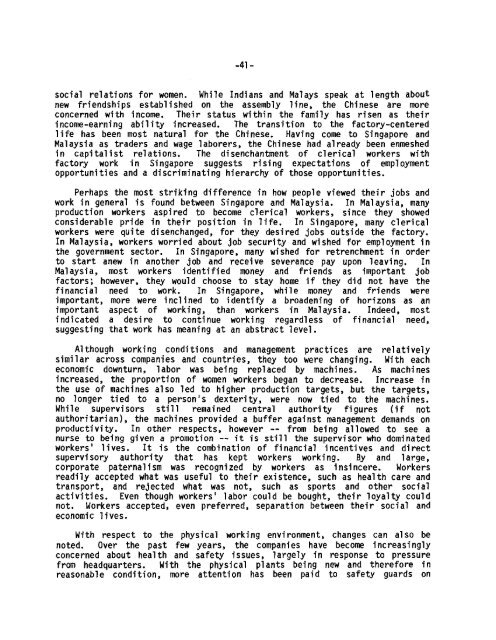Health, Women's Work, and Industrialization - Center for Gender in ...
Health, Women's Work, and Industrialization - Center for Gender in ...
Health, Women's Work, and Industrialization - Center for Gender in ...
Create successful ePaper yourself
Turn your PDF publications into a flip-book with our unique Google optimized e-Paper software.
-41-<br />
social relations <strong>for</strong> women. While Indians <strong>and</strong> Malays speak at length about<br />
new friendships established on the assembly l<strong>in</strong>e, the Ch<strong>in</strong>ese are more<br />
concerned with <strong>in</strong>come. Thei r status withi n the family has ri sen as their<br />
<strong>in</strong>come-earn<strong>in</strong>g abil ity <strong>in</strong>creased. The transition to the factory-centered<br />
1 i fe has been most natural <strong>for</strong> the Chi nese. Havi ng come to S<strong>in</strong>gapore <strong>and</strong><br />
Malaysia as traders <strong>and</strong> wage laborers, the Ch<strong>in</strong>ese had already been enmeshed<br />
<strong>in</strong> capitalist relations. The disenchantment of clerical workers with<br />
factory work <strong>in</strong> S<strong>in</strong>gapore suggests ris<strong>in</strong>g expectations of employment<br />
opportunities <strong>and</strong> a discrim<strong>in</strong>at<strong>in</strong>g hierarchy of those opportunities.<br />
Perhaps the most strik<strong>in</strong>g difference <strong>in</strong> how people viewed their jobs <strong>and</strong><br />
work <strong>in</strong> general is found between S<strong>in</strong>gapore <strong>and</strong> Malaysia. In Malaysia, many<br />
production workers aspired to become clerical workers, s<strong>in</strong>ce they showed<br />
considerable pride <strong>in</strong> their position <strong>in</strong> life. In S<strong>in</strong>gapore, many clerical<br />
workers were quite disenchanged, <strong>for</strong> they desired jobs outside the factory.<br />
In Malaysia, workers worried about job security <strong>and</strong> wished <strong>for</strong> employment <strong>in</strong><br />
the government sector. In Si ngapore, many wi shed <strong>for</strong> retrenchment <strong>in</strong> order<br />
to start anew <strong>in</strong> another job <strong>and</strong> receive severance pay upon 1 eavi ng. In<br />
Malaysia, most workers identified money <strong>and</strong> friends as important job<br />
factors; however, they wou1 d choose to stay home if they di d not have the<br />
f<strong>in</strong>ancial need to work. In S<strong>in</strong>gapore, while money <strong>and</strong> friends were<br />
important, more were <strong>in</strong>c1 <strong>in</strong>ed to identify a broaden<strong>in</strong>g of horizons as an<br />
important aspect of work<strong>in</strong>g, than workers <strong>in</strong> Malaysia. Indeed, most<br />
<strong>in</strong>dicated a desire to cont<strong>in</strong>ue work<strong>in</strong>g regardless of f<strong>in</strong>ancial need,<br />
suggest<strong>in</strong>g that work has mean<strong>in</strong>g at an abstract level.<br />
Although work<strong>in</strong>g conditions <strong>and</strong> management practices are relatively<br />
similar across companies <strong>and</strong> countries, they too were chang<strong>in</strong>g. With each<br />
economic downturn, labor was be<strong>in</strong>g replaced by mach<strong>in</strong>es. As mach<strong>in</strong>es<br />
<strong>in</strong>creased, the proportion of women workers began to decrease. Increase <strong>in</strong><br />
the use of machi nes a1 so 1 ed to hi gher producti on targets, but the targets,<br />
no longer ti ed to a person's dexterity, were now ti ed to the machi nes.<br />
While supervisors still rema<strong>in</strong>ed central authority figures (if not<br />
authoritarian), the mach<strong>in</strong>es provided a buffer aga<strong>in</strong>st management dem<strong>and</strong>s on<br />
producti vity. In other respects, however -- from bei ng all owed to see a<br />
nurse to be<strong>in</strong>g given a promotion -- it is still the supervisor who dom<strong>in</strong>ated<br />
workers'lives. It is the comb<strong>in</strong>ation of f<strong>in</strong>ancial <strong>in</strong>centives <strong>and</strong> direct<br />
supervisory authority that has kept workers work<strong>in</strong>g. By <strong>and</strong> large,<br />
corporate paternalism was recognized by workers as <strong>in</strong>s<strong>in</strong>cere. <strong>Work</strong>ers<br />
readily accepted what was useful to their existence, such as health care <strong>and</strong><br />
transport, <strong>and</strong> rejected what was not, such as sports <strong>and</strong> other social<br />
activities. Even though workers' labor could be bought, their loyalty could<br />
not. <strong>Work</strong>ers accepted, even preferred, separation between their social <strong>and</strong><br />
economic lives.<br />
With respect to the physical work<strong>in</strong>g environment, changes can also be<br />
noted. Over the past few years, the companies have become <strong>in</strong>creas<strong>in</strong>gly<br />
concerned about health <strong>and</strong> safety issues, largely <strong>in</strong> response to pressure<br />
from headquarters. With the physical plants be<strong>in</strong>g new <strong>and</strong> there<strong>for</strong>e <strong>in</strong><br />
reasonable condition, more attention has been paid to safety guards on




